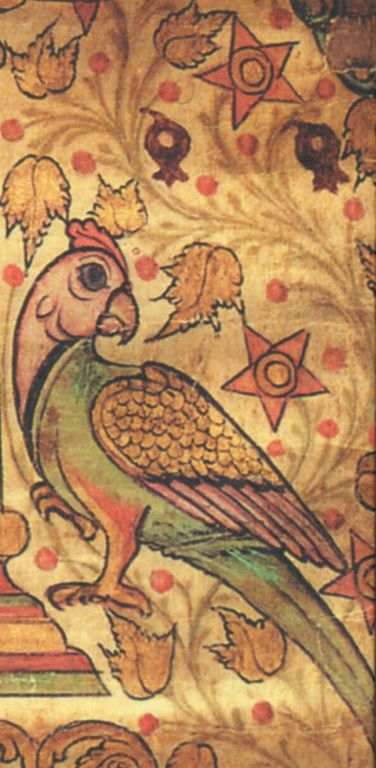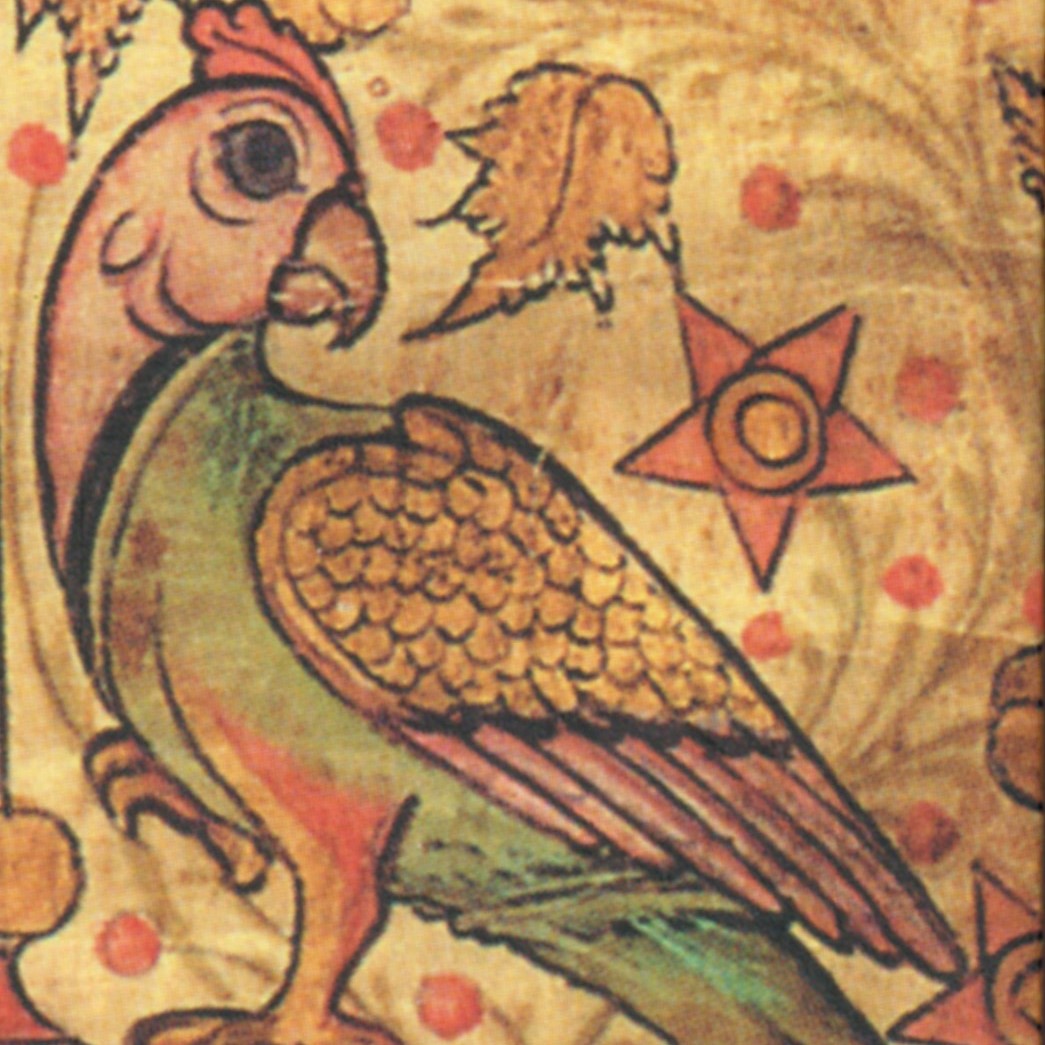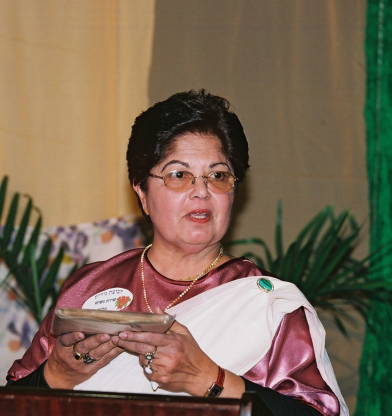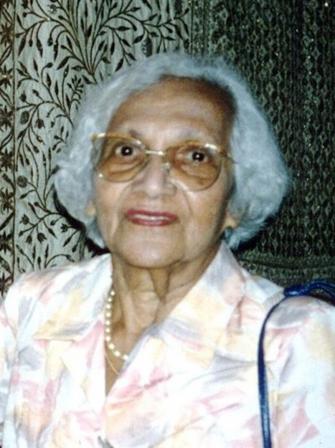1981/ 1977
56. The Song of Ruth
56a. Rahel Itzhak, Rahel Nehemiah, Simcha Eliyahu. Recorded by Shirley Isenberg, Moshav Nevatim, August 30, 1981; III-5.
56b. Miriam Eliyahu. Recorded by Shirley Isenberg, Moshav Mesilat Zion, October 26, 1977; III-5.
56c. Esther Abraham. Nevatim, 2006.
Piņyaṃ pĕrutāyi phūvāsu nāṭṭilu
Uņḍāya paññamo eṟuśulāyilu
Eṟuśulāyīnnu vannoru puruṣanuṃ
Puruṣan elimeleh acciyuṃ makkaḷuṃ
1. ‘Twas in the time of Boaz, the very holy man,
When there occurred a famine in Jerusalem.
Then from Jerusalem there came out a man.
The man was Elimelek with his wife and sons.
Into the land of Moab they went and settled down.
But after living there for just a little while
Elimelek died; in peace he rested there.
Naomi and the two were left together there.2. Malon and Kiliyon married women there—
Wives from a different People, not from their own caste.
Then they both attained honored positions there.[1]
Malon and Kiliyon died; they rested there in peace.
With her elder daughter-in-law first Naomi spoke.
The elder daughter-in-law then changed her mind.
To her younger daughter-in-law next she turned and said:
“My daughter, go back; to your People return.”3. “Don’t say that to me; don’t say that, Ammāyi.[2]
If dying or if going, we two shall be as one.
If parted by death, we two shall be as one.
To join the Jewish People my desire is great.”
“To join the Jewish People your trouble will be great!
Know that Saturday should always be observed.
The First of the Month also should be kept.[3]
You might jump in the fire, or be cut by sword,4. Or you could be hanged; or you could be stoned.
In each of these four ways the law can be fulfilled.”
“Whatever it is that the Jewish People do,
Whatever you are doing, I also will do.”
The two lived together for the next ten years,
And together after that, the two of them set forth.
On Passover eve they reached Jerusalem.
The people of the place inquired “Who are you?5. Are you not the woman, Naomi by name?”
“Don’t call me ‘Naomi’; I’m not a ‘pleasant’ one.
You can call me ‘Mārā,’ for a ‘bitter’ woman I am.”[4]
“Everyone is going to see the harvest now!
Please let me go along. Oh, let me go and see!”
After hesitating, Naomi murmured, “Mmmm.”
So [Ruth] went for the harvest to the field of Boaz,
Picking up stalks in between the sheaves.6. And then Boaz went to see the harvest too.
“Oh, who is that young girl, the one standing there?”
“She is the daughter-in-law of Naomi Ammāyi.”
“Don’t say bad things about her,” Boaz declared.
“Don’t shame or insult her—not in any way!”
After the harvesting, they sat down for lunch.
In comfort while they sat, eating and blessing,
“Spread out your covering shawl”—thus she was told.7. When she had spread it, spread the covering shawl,
Then to her was given six measures [of grain].
Again she was given—six measures more.
All this she carried and gave to her Ammāyi.
“So where did you go for the harvest today?”
“To the field of Boaz—the biggest in the land.”
“Well, he’s your Redeemer Man! He’s the man for you!
Tomorrow again you must go to his field!8. But first you must bathe to make yourself fair.”
Made fair by bathing, she went and there she stood.
“Oh, tell me woman, now why have you come?
Who was the one who told you to come?”
“It’s not just anyone who told me to come—
That’s not the reason, not why I have come.
It was Ammāyi Naomi who told me to come.
I came to fulfill the law of the Lord.”9. “There’s one closer man, a relative of mine.
But if he’s not the one who will fulfill the law,
Well then, behold! I’m the one to do it!”
In the paḷḷi of justice where the people meet,
It was Boaz himself who fulfilled that law.
May Tamburan be blessed, forever be blessed.
Blessings and blessings, may Tamburan be blessed,
Forever and ever, may Tamburan be blessed.
This popular ballad recounting the biblical story of Ruth appears in twelve Jewish song notebooks from communities in Kochi, Ernakulam, Chendamangalam, and Parur. In his efforts to textualize the lyrics, Zacharia found enough significant linguistic and narrative differences among the versions to create four texts, numbered M19-M22 in Zacharia and Gamliel 2005, 77–86. Our translation here is based primarily on his text M22, (84–86), which is close to the version sung from memory by Esther Abraham from Chendamangalam in a 2004 Moshav Nevatim videorecording. For clarification, we have also added a few lines from Zacharia’s text M19, (77–79).
The Malayalam “Song of Ruth” is traditionally sung during the seasonal holiday of Shavuot, when the Hebrew Book of Ruth is also recited, but it is not a simple translation of the Hebrew. In addition to local cultural references, its elements from midrash reveal Kerala Jewish familiarity with the Talmudic commentary Targum Ruth,[5] which narrates that Elimelekh and his sons (portrayed in stanza 2 of the song as attaining “honored positions”) were governors in Moab (Targum Ruth 1:2). In stanzas 4 and 5 of this song, Naomi gives dire warnings to discourage Ruth from accompanying her. These warnings reflect a legalistic interpretation of the law of conversion which, in addition to documenting the conversion itself, advises of the four death penalties permitted in Jewish law (Targum Ruth 1:17). The appearance of Boaz in a public meeting place to “fulfill the law” in stanza 9 echoes the midrash that he confirmed his position as the redeeming kinsman by going to the religious court of the Sanhedrin, who witnessed his marriage to Ruth (Targum Ruth 4:1–10).
In combination with its echoes of Hebrew learning, this song is filled with idiomatic Jewish Malayalam vocabulary, such as the phrase shālom āyi for dying, found in a number of the songs and translated as “resting in peace”; ammāyi, the Jewish Malayalam honorific term for mother-in-law; the “covering shawl” worn by Kerala Jewish women to cover their upper body and head in the synagogue; the unusual term saliman tingal for the first day of the Jewish month (Hebrew: Rosh Ḥodesh), which should be particularly observed by women; and the uniquely Jewish Malayalam term “Redeemer Man,” sometimes referring to the Messiah but used here to refer to the relative of a deceased husband who has the right and responsibility in Jewish law to marry (“redeem”) the widow.
Zacharia notes that the colloquial style of this folksong renders it divisible into dramatic scenes, with informal conversational exchanges such as that in stanzas 5 and 6, where Naomi first mumbles a less-than-enthusiastic assent to Ruth’s request to visit the harvest, then exclaims with delight at her report that she had gleaned in the field of Boaz. In our translation, indentations are used to indicate change of voice in these conversational passages.
It is interesting to note that the name Ruth is not explicitly mentioned throughout the song—only in its Malayalam title.
The song is also notable for placing the issue of intermarriage in an Indian context, using two Malayalam terms in stanza 2 to recount Naomi’s sons marrying “wives from a different People (kulam), not of their own caste (jati).” As discussed in the commentary for songs 5 and 22, the term “kulam” (or colloquially gulam) is used in many of the Malayalam Jewish songs to refer to the Jewish people as a whole, and we have translated it throughout as “People” (capitalized, and not literary from the Hebrew meaning, “everyone”). Kerala Jews sometimes refer to themselves (all Kerala Jews) in more local terms as belonging to the Jewish “jati” (caste) and to non-Jews as belonging to a different jati. The Indian term “jati” is less common than “kulam” in the song collection, though it also appears in two of the twentieth century Zionist songs—songs 72 and 74.
Venus Lane notes that the melody for the Song of Ruth, as recorded in 1977 in Moshav Nevatim, is the melody used in her Paradesi community to recite the passage “Shefokh” in the Hebrew Haggadah, the text recited at the Seder meal on the first two nights of Passover. The Song of Ruth was recorded to that same melody by singers from Ernakulam and Chendamangalam.
_____________________________
[1] Alternate line in another version: “So divine displeasure came upon them there.”
[2] In Jewish Malayalam Ammāyi is an honorific term for mother-in-law.
[3] The Malayalam words for Saturday and First of the Month are used here, rather than the Hebrew terms for Shabbat and Rosh Hodesh—both of which should be observed by Jewish women with special prayers, activities, and restrictions.
[4] The two names are derived from the Hebrew words “pleasant” and “bitter.” See Ruth 1:20.
[5] Targum Ruth in English, translation by C.M.M Brady. http://targuman.org/targum-ruth/targum-ruth-in-english/ Accessed July 15, 2022. (A Targum is a Jewish Aramaic translation of a book in the Hebrew Bible, which may include commentary in addition to translation.)







